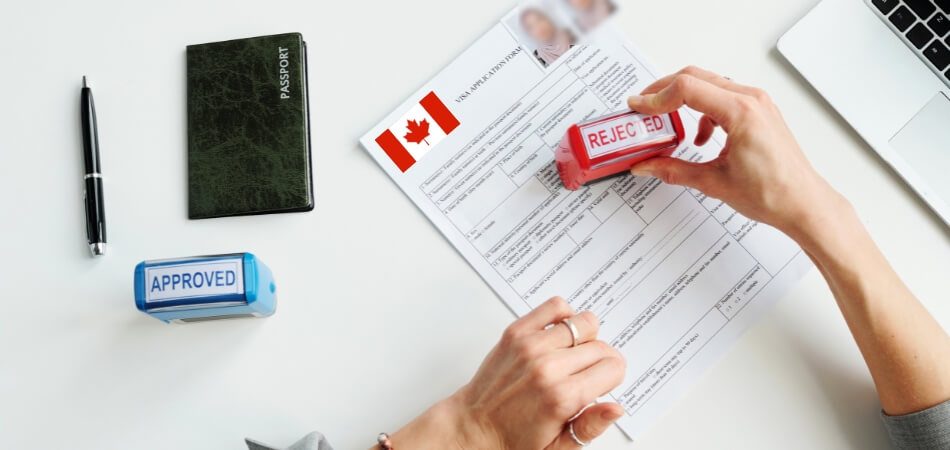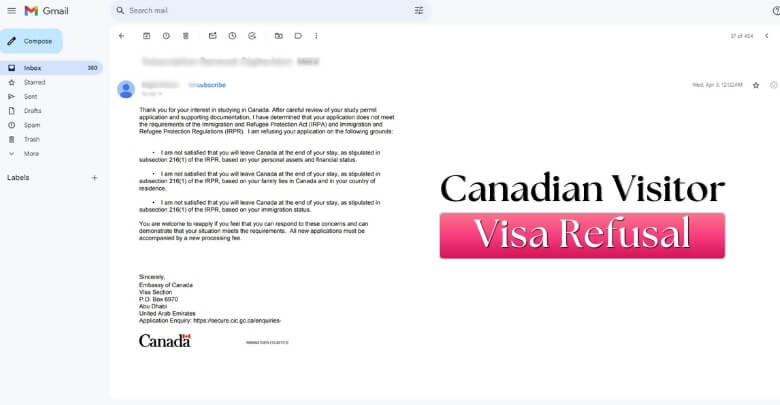Managing the intricate web of visa applications can often lead to feelings of uncertainty and frustration. One moment, you’re dreaming of experiencing the serenity of Banff or the vibrancy of Toronto, and the next, you’re staring at a rejection letter. It’s a painful moment that leaves many asking, “Why?”
A pivotal question is at the heart, what are the Canada visitor visa refusal reasons? Understanding these reasons is essential, not only for clarity but for future success.
By recognizing the potential pitfalls and common oversights, you position yourself better for your next application, turning previous disappointments into proactive steps forward. Don’t lose heart; with the proper knowledge, the dream of exploring Canada is well within reach.
What Is the Canadian Visitor Visa & how Does It Work?
The Canadian Visitor Visa is a document that allows tourists to enter Canada for short stays. This visa is ideal for those who plan to attend a conference in Canada or explore its cities and natural beauty for a short period of time. Each applicant must show proof of their home ties and the reason for visiting to get approved.
Applying for this visa involves filling out an online form and submitting necessary documents. Applicants need to provide a passport, photos, and sometimes a letter of invitation. They must also pay a processing fee, which varies by country and visa type.
Once approved, the visa is typically valid for up to six months from the entry date. Travelers must enter Canada before the visa expires to ensure legality. During their stay, visitors can travel freely within Canada but must leave by their visa’s expiry date.
Requirements of Visitors Visa Approval for Canada
Canada’s allure as a top tourist destination is undeniable. However, securing a Visitor Visa requires meeting specific vital criteria.
Financial Stability
Applicants must demonstrate they have adequate funds for their trip. This ensures they can support themselves during their stay. Documentation like bank statements or payslips can act as proof.
Proof of Ties to Home Country
Applicants must show they’ll return home post-visit. Owning property, stable jobs, or family ties can strengthen an application. These aspects assure officers of the traveler’s temporary intent.
Clear Travel Itinerary
An outlined plan is essential for your visit’s duration. This can include hotel bookings, flight details, and sightseeing plans. A structured agenda reflects genuine tourist intentions.
Medical Examination & Clean Record
Depending on the country, a medical exam may be mandatory. The applicant should also have no criminal history. A police certificate could be requested to confirm this.
Letter of Invitation
If someone is hosting the visitor, a formal invitation is valuable. The letter should detail the host’s relationship to the visitor and the trip’s purpose. It must also mention the host’s status in Canada.
By following these requirements, the chances of getting a Canadian visa are significantly increased, making it easier to travel to Canada within the timeframe of the Canadian visa application.
Canada Visitor Visa Refusal Reasons – Why?
Exploring the reasons behind Canada’s Visitor Visa refusals can offer clarity for future applications. Let’s dive into some primary causes behind these denials.
Insufficient Financial Proof
A visitor must prove financial capability for the trip’s duration. Officers must have ample evidence to doubt one’s ability to support oneself. This includes accommodation, food, and other travel expenses.
Weak Ties to Home Country
Ensuring visitors will leave Canada post-trip is essential. If an applicant lacks substantial ties to their home, rejection risks rise. Home ties can be familial, professional, or property-based.
Unclear Purpose of Visit
A vague travel plan can raise suspicions. Clearly outlining one’s travel itinerary ensures a trip’s genuine intent. Highlighting places to visit, stays, and duration is crucial.
Criminal History
Canada prioritizes the safety of its residents. A past criminal record without rehabilitation proof can lead to visa denial. Securing a clearance certificate helps the process.
Misrepresentation in Application
Honesty in the application process is paramount. Any discrepancies, even if unintended, can trigger refusals. It’s imperative to cross-check and ensure all data aligns.
Understanding these reasons can guide hopeful travelers to compile more robust, accurate applications in the future.
What to do When Your Canadian Visitor Visa Gets Refuse?
Facing a refusal for a Canadian Visitor Visa can be disheartening. However, understanding the following steps can help in maneuvering the situation effectively.
Step 1: Understand the Reason for Refusal
Addressing the specific cause can improve subsequent applications. When preparing to reapply, plan on writing a letter of explanation that addresses each point mentioned in the refusal letter. This approach can significantly enhance your chances of a successful application on your next attempt.
Step 2: Consider Reapplying
If circumstances have changed or you can better address concerns, consider reapplying. Ensure your new application strengthens weak areas pinpointed in the refusal. Always provide fresh, updated documents.
Step 3: Seek Legal Advice
Sometimes, it’s beneficial to consult an immigration lawyer. They can provide insights into your refusal’s nuances. Their expertise can guide a stronger reapplication or appeal.
Step 4: Evaluate the Appeal Option
Not all refusals are open to formal appeals. However, if eligible, you may challenge the decision in court. This process is lengthy, so consider the time investment.
Step 5: Consider Alternative Visa Categories
There are multiple visa categories for entering Canada. If one route closes, another might be available. Explore different visa types that fit your intent and situation.
By meticulously following these steps, you can deal with the challenges of a visa refusal and chart a path toward a successful reapplication.
How To Avoid Visitor Visa Refusal In Canada?
Managing the Canada Visitor Visa process requires foresight and meticulous preparation. Implementing specific strategies can significantly reduce the likelihood of refusal.
Submit Complete and Accurate Documents
A complete application often leads to refusal. Ensure all required documents are attached, updated, and accurate. Double-check each detail before submission to avoid discrepancies.
Showcase Strong Ties to Your Home Country
Emphasize your intention to return home post-visit. Highlight solid ties like job commitments, family responsibilities, or property ownership. These ties indicate a temporary stay intention.
Offer a Clear Travel Itinerary
A well-defined plan assures immigration officers of genuine intent. Outline hotel bookings, places to visit, and duration clearly. This clarity reflects a genuine tourism purpose.
Maintain a Clean Record
Canada is stringent about security. Any past criminal record can lead to visa denial. If applicable, provide rehabilitation proof or clearance certificates.
Stay Transparent and Honest
Misrepresentations, even unintentional, can lead to visa refusal. Always remain transparent and truthful in your details. Ensuring consistency across documents is imperative for trust-building.
Adopting these strategies can significantly bolster your visa application, elevating the chances of enjoying a memorable trip to Canada.
Bottom Lines
Securing a Canadian visitor visa can feel daunting, especially when faced with a refusal. Diving deep into the Canada visitor visa refusal reasons sheds light on common pitfalls and misunderstandings that applicants encounter.
The silver lining, however, is that understanding these reasons can rectify past mistakes, better prepare for future applications, and increase the chances of success. It’s not about dwelling on past rejections but instead leveraging this knowledge for proactive change.
With the right approach and careful attention to detail, the dream of exploring the Canadian expanse can become a reality. Remember, knowledge is power; use it wisely, and the path to Canada may become more accessible.








